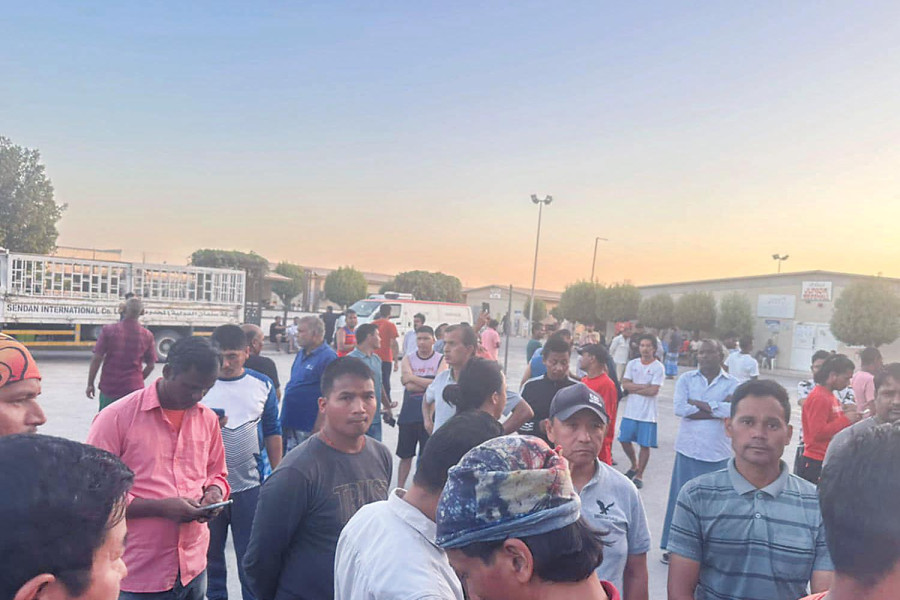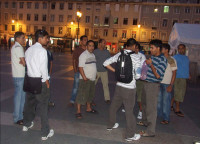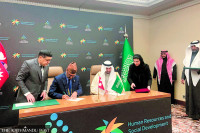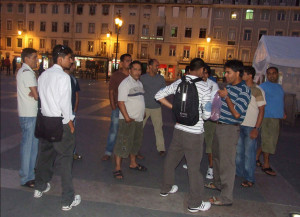Nepali Diaspora
469 Nepali workers stranded in Saudi Arabia after company collapse
Workers say they have not been paid for up to a year, and face difficulties returning home due to visa issues.
Hom Karki
A total of 469 Nepali migrant workers have been stranded in Saudi Arabia for the past eight months after Sendan International Company, the firm they had been working for, went bankrupt.
According to the Nepali Embassy in Riyadh, the workers were employed at various sites under Saudi oil and gas giant Aramco in Jubail. They have not received salaries for durations ranging from four months to one year. Many of the workers had been with the company for between two and sixteen years, but have yet to receive their end-of-service benefits.
The embassy said that the company officially ceased operations on December 24. Before shutting down, the company paid unskilled workers a minimum monthly wage of 1,300 riyals.
Ram Prasad Yadav, who worked at the company for 10 years, said that he and his fellow workers are now living in the workers’ camp and only receive two meals a day. “We don’t have any money. Some of our friends have fallen ill and we’re unable to afford medicine,” he said.
Dambar Bahadur Rai, a worker from Solukhumbu who had been employed for 28 months, said he submitted his biometric data at the immigration office three months ago, but the repatriation process has yet to begin. “We worked on scaffolding projects at Aramco’s gas plant and used to earn up to 2,500 riyals per month. After the company shut down the site, we were left jobless,” he said.
Rai mentioned that 206 workers from his camp have already completed their biometric submission to begin the exit process. Workers whose visas have expired are required to complete a clearance process at immigration in order to obtain exit permits.
Kabiraj Uprety, labour counsellor at the Nepali Embassy in Riyadh, said repatriating the stranded workers could take up to another month. “All of their residency permits have expired. The Saudi Labour Department has informed us that issuing the exit permits will take another month,” he said.
According to Uprety, of the 469 affected workers, 243 are ready to return to Nepal, while 226 wish to transfer to other companies. “Those who still had valid visas have already returned. For those whose residency permits have expired, fines must be waived before exit permits can be issued,” he said.
Uprety added that discussions are underway with new employers in Saudi Arabia who are willing to bear the penalty costs for workers who want to stay. However, technical issues have hindered the online system, allowing workers to apply for exit permits.
He said the embassy had approached the Saudi Labour Department in Riyadh to resolve the issue and received assurances that it would be addressed within a month.
The workers will unlikely receive their unpaid wages and benefits anytime soon despite these efforts. “Our first priority now is to send the workers back home. To recover the unpaid salaries and entitlements, legal proceedings must be initiated,” Uprety said. “There is a process in Saudi Arabia to settle claims from a collapsed company. The company must be taken into liquidation.”
Hari Bahadur Budhathoki, vice-president of the Nepali Jan Pragatishil Manch in Saudi Arabia, said they have been distributing medicines to sick workers. Budhathoki and members Bikram Shreepali and Sunil Century provided medicine to those suffering from diabetes and high blood pressure.
“There are some seriously ill workers in the camp who require urgent medical attention,” Budhathoki said. “They have been confined inside the camp for a long time, and they must be rescued and repatriated without further delay.”




 13.12°C Kathmandu
13.12°C Kathmandu













